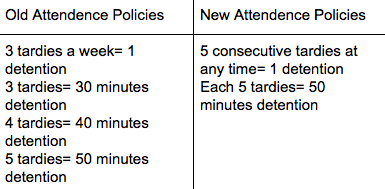Decatur implements new attendance policies
Decatur implemented new school policies on August 20 to combat tardiness, including a warning bell and a limit on tardies.
Assistant Principal Wesley Hatfield said that he hopes these new school policies will decrease the amount of students who are late to class or who are skipping.
When Hatfield graduated from Decatur in 1999, they had a warning bell, but they stopped it when they switched to a 7-period schedule.
“Before we had the electronic bells all we had was just one noise and if you tried to do a warning bell and a late bell with one bell sound and 7 periods, people are just going to be confused,” he said.
Administration always intended to add in the warning bell, Hatfield said, but decided to implement the bell this year.
Another policy new to Decatur is the limit on tardies. Last year, three tardies in a week led to detention; however, the new limit of five accumulated tardies makes it much easier to follow up on tardiness.
Hatfield said. “We felt like doing one [detention] for every five [tardies] would continue to hold people accountable to getting to school on time,” Hatfield said.

Hatfield also said that he is not sure whether the five tardies will reset each semester or if they will add up altogether throughout the year.
Although administration supports the enactment of the policies, among students there has been controversy.
“I feel like they’re focused on the wrong things at Decatur and that tardies shouldn’t be the first concern,” Freshman Max Tyler said.
Contrasting with Decatur’s new policies, Tyler said that the attendance policies are stricter this year at Decatur than they were last year at Renfroe.
“At Renfroe you didn’t really have to go get passes and it didn’t interfere with class as much,” Tyler said.
As a part of the new attendance policy, Hatfield began calling students with attendance issues over the intercom during the morning announcements.
In the past, Hatfield said, administration determined whether a student was skipping when the teacher checked their attendance and noticed the student had not been in that class, but had been in previous classes earlier in the day.
“[The past process was] not the most equitable way to follow up on attendance issues,” Hatfield said. “The best way to do it is to look at attendance data and identify every kid who might have been skipping.”
Hatfield said the students he is calling down have “an attendance pattern who could have been skipping, but most of them weren’t.”
The purpose of this, however, is not just attendance issues. It is also to get everyone’s attendance correct.
Hatfield said that while this policy might continue throughout the entire year, he hopes there is a diminished need for it.
He says he will only stop when he feels, “there is another way to be fair in how attendance issues are being followed up.”
Hatfield has noticed improvement since he began calling names on the announcements.
“I’ve gone from having between 50 and 60 a day to having between 30 and 40 a day,” he said. “Part of that is I think people understand that if they do skip, they are going to get caught, but another part of it is, everyone’s paying more attention to accurate attendance.”






